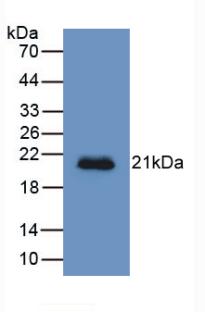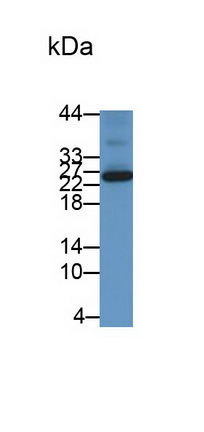Monoclonal Antibody to Hemojuvelin (HJV) 

HFE2; HFE2A; HJV; JH; RGMC; hemochromatosis type 2(Juvenile); Haemojuvelin; RGM domain family member C
Overview
Properties
- Product No.MAB995Hu22
- Organism SpeciesHomo sapiens (Human) Same name, Different species.
- ApplicationsWB
If the antibody is used in flow cytometry, please check FCM antibodies.
Research use only - DownloadInstruction Manual
- CategoryMetabolic pathwayInfection immunityHematologyNutrition metabolismHormone metabolism
- SourceMonoclonal antibody preparation, Host Mouse
- Ig Isotype IgG2b Kappa, Clone Number C5
- PurificationProtein A + Protein G affinity chromatography
- LabelNone
- Immunogen RPB995Hu01-Recombinant Hemojuvelin (HJV)
- Buffer Formulation0.01M PBS, pH7.4, containing 0.05% Proclin-300, 50% glycerol.
- TraitsLiquid, Concentration 1mg/ml
Sign into your account
Share a new citation as an author
Upload your experimental result
Review

Contact us
Please fill in the blank.
Specifity
The antibody is a mouse monoclonal antibody raised against HJV. It has been selected for its ability to recognize HJV in immunohistochemical staining and western blotting.
Usage
Western blotting: 0.01-2µg/mL;
Optimal working dilutions must be determined by end user.
Storage
Store at 4°C for frequent use. Stored at -20°C in a manual defrost freezer for two year without detectable loss of activity. Avoid repeated freeze-thaw cycles.
Stability
The thermal stability is described by the loss rate. The loss rate was determined by accelerated thermal degradation test, that is, incubate the protein at 37°C for 48h, and no obvious degradation and precipitation were observed. The loss rate is less than 5% within the expiration date under appropriate storage condition.
Organism Species More: Rattus norvegicus (Rat)Giveaways
Increment services
-
 Antibody Labeling Customized Service
Antibody Labeling Customized Service
-
 Protein A/G Purification Column
Protein A/G Purification Column
-
 Staining Solution for Cells and Tissue
Staining Solution for Cells and Tissue
-
 Positive Control for Antibody
Positive Control for Antibody
-
 Tissue/Sections Customized Service
Tissue/Sections Customized Service
-
 Phosphorylated Antibody Customized Service
Phosphorylated Antibody Customized Service
-
 Western Blot (WB) Experiment Service
Western Blot (WB) Experiment Service
-
 Immunohistochemistry (IHC) Experiment Service
Immunohistochemistry (IHC) Experiment Service
-
 Immunocytochemistry (ICC) Experiment Service
Immunocytochemistry (ICC) Experiment Service
-
 Flow Cytometry (FCM) Experiment Service
Flow Cytometry (FCM) Experiment Service
-
 Immunoprecipitation (IP) Experiment Service
Immunoprecipitation (IP) Experiment Service
-
 Immunofluorescence (IF) Experiment Service
Immunofluorescence (IF) Experiment Service
-
 Buffer
Buffer
-
 DAB Chromogen Kit
DAB Chromogen Kit
-
 SABC Kit
SABC Kit
-
 Long-arm Biotin Labeling Kit
Long-arm Biotin Labeling Kit
-
 Real Time PCR Experimental Service
Real Time PCR Experimental Service
Citations
- Effect of Iron Overload and Iron Deficiency on Liver Hemojuvelin ProteinPubMed: PMC3356351
- Hepcidin Levels Are Increased in Patients with Acute Ischemic Stroke: Preliminary ReportPubMed: 25881778
- Soluble hemojuvelin in transfused and untransfused thalassaemic subjectsdoi:10.1111
- The secret war against counterfeit sciencepubmed:28492262
- Urinary biomarkers predict advanced acute kidney injury after cardiovascular surgeryPubmed:29699579
- Hemojuvelin Predicts Acute Kidney Injury and Poor Outcomes Following Cardiac SurgeryPubmed:29386545
- The functional role of hemojuvelin in acute ischemic strokePubmed: 31307288
- Oxidative damage and iron dyshomeostasis in thalassemic patients
- Caffeine and alcohol-friends or foes of human iron stores?Pubmed:35063815
- Urinary Biomarkers Can Predict Weaning From Acute Dialysis Therapy in Critically Ill PatientsPubmed:35311928
- The Relationships among Plasma Fetuin-B, Thyroid Autoimmunity, and Fertilization Rate In Vitro Fertilization and Embryo TransferPubmed:35340679








